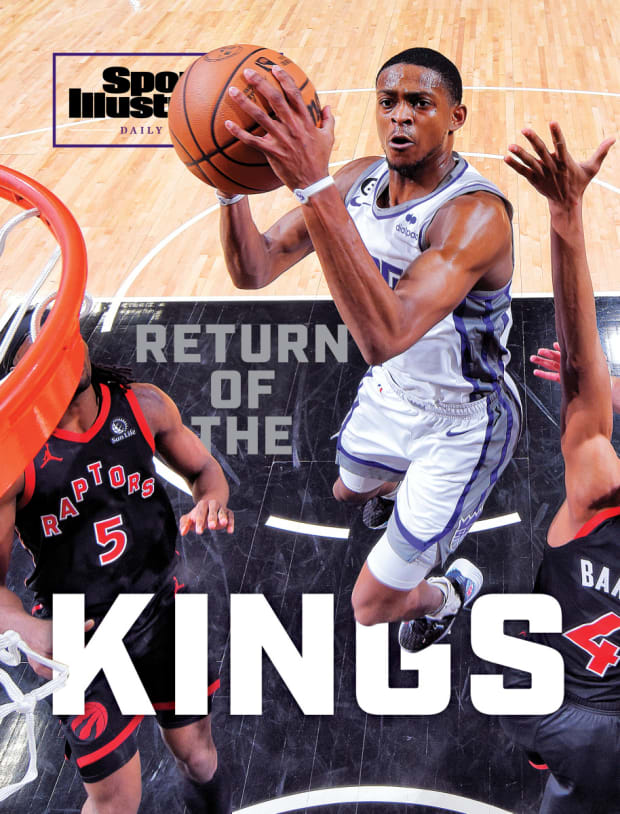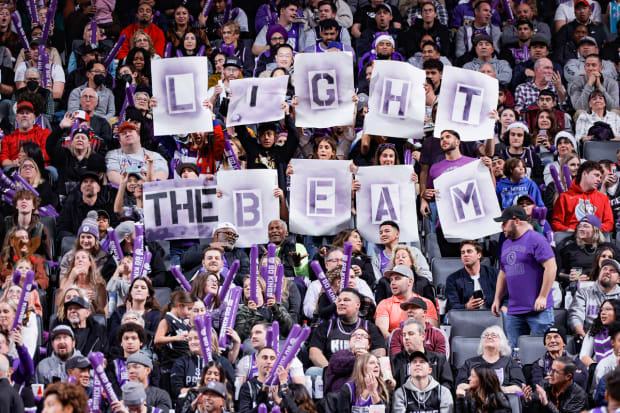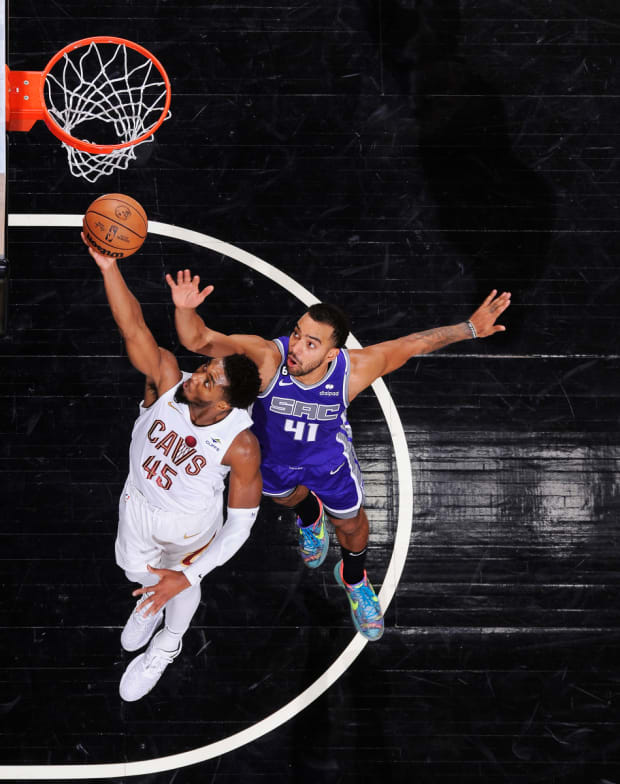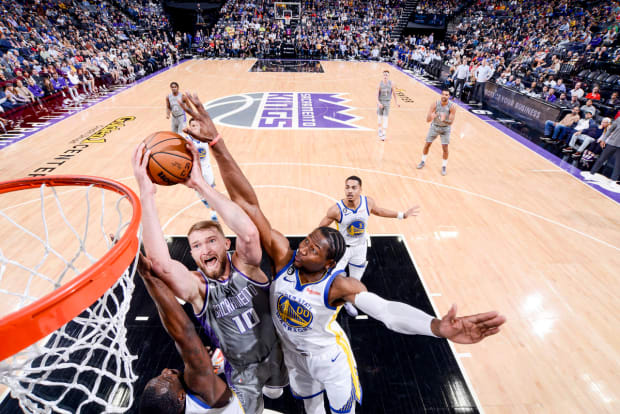For all the joy and overwhelming emotion that accompanies the birth of a child, there is one thing no parent looks forward to: the often-debilitating lack of sleep.
Yet sleeplessness hasn’t been an issue for Kings guard De’Aaron Fox since he and his wife, Recee, welcomed baby Reign to the family just over a month ago. “It’s weird—I’ve gotten good sleep ever since he’s come to us,” says Fox, who’s scored 30 points in 10 of his last 12 games.
Fox’s undisturbed slumber is far from the only surprise playing out in Sacramento this season. Many would have figured that the Kings—in the midst of the longest playoff drought in NBA history—would leave fans bleary-eyed, too, if not earlier in the campaign, then certainly by now, as the season plows into the homestretch.

Rocky Widner/NBAE/Getty Images
Instead, a squad that was supposed to make strides defensively with its new, no-nonsense, defense-first coach has somehow become historically unstoppable on offense. The long-tortured fan base, which has in the recent past born the indignity of Sacramento airport shops stocking Warriors, but often not Kings merchandise, is slowly shedding its pessimism to realize this season isn’t a mere fever dream. The red-hot Kings, tied for second in the West at 38–26, stand not only as one of the NBA’s most entertaining teams but perhaps one of its best.
“Ask our guys and they’ll tell you: I’ve said since Day 1 that I did not come here to make the playoffs—I came here to compete at the highest level and chase a championship like everyone else,” coach Mike Brown says. “I feel our group is convinced we’re better than just making the playoffs. I’ve placed that in our guys’ heads all year, and I hope they feel that way now, too.”

Rocky Widner/NBAE/Getty Images
It’s not hard to get to the bottom of why the Kings have been winning this season. Their half-court offense looks like a frenzied game of kick the can: five players darting every which way, past befuddled defenders as they target the goal.
Powered by Fox, the team’s blisteringly quick All-Star floor general, Sacramento plays at one of the NBA’s fastest cadences, and scores at the highest clip in basketball after forcing a live-ball turnover: 1.44 points per possession, according to advanced data site Inpredictable. But zooming out from how fast the Kings play on offense, they’re also incredibly efficient. How efficient? They own the highest offensive rating in league history, scoring 118.6 points for every 100 times they have the ball.
The club utilizes a league-high 10.3 handoffs each night, and does so with incredible efficiency, usually orchestrating them along the perimeter between All-Star center Domantas Sabonis and the team’s wings. Kevin Huerter and Keegan Murray race right off the shoulder of Sabonis, allowing him to serve as a roadblock for defenders who are chasing the sharpshooters.
“A lot of guys don’t like me because of how physical I am on those screens,” Sabonis says with a smile. “But if I was on their team, they’d probably love me for it.”
In instances where defenses are forced to spread out to cover perimeter shooters, Sabonis—one of the most physical players in the sport and a 61.5% shooter from the field—simply bullies his way toward the basket. As the NBA’s second-best passing big man after Nikola Jokić, he’s capable of identifying a soft spot in the defense to set up another teammate. The Kings thrive on that kind of ball movement and unselfishness: They play one-on-one less often than just about any team, but when they do, it pays off with the highest scoring rate on those isolation looks. “We just try to keep the ball moving. There’s no ego, no one saying, ‘I need to score this much,’” Sabonis says. “We all just want to win.”
The best example of this: The Kings were down by two points with 25 seconds to go against the Jazz at home in Sacramento’s last game before the new year. Fox dribbled down the floor around a Sabonis screen before missing a jumper from the elbow. The ball hung on the rim an extra beat, allowing Sabonis to outmaneuver two different Utah players who looked better positioned to grab the board. Fox got the ball back and tried a floater from nearly the same spot. But it was short, and the crowd briefly sounded dejected as it looked like Jazz All-Star Lauri Markkanen would come up with the rebound. But it slipped through Markkanen’s hands, allowing Kings forward Harrison Barnes to grab it and kick a pass out to Murray, who immediately swung the ball to his left, where a wide-open Huerter was standing, ready to launch from 28 feet away.
Watch the Kings with fuboTV. Start your free trial today.
For the brief moment Huerter’s attempt hung in the air, there was a hum of anticipation. The moment the shot splashed through the basket, the noise turned into an explosion, the likes of which haven’t been heard here in perhaps more than a decade. “I was there in the lower bowl that night, and I swear to you: When that shot from Huerter went in, it got so loud in the arena that my vision went blurry for a second,” says Chris Yang, a 37-year-old season-ticket holder who lives in Sacramento and works as an IT director. “I’ve never heard anything like that in my life.”
That game-winning moment saw all five members of the group touch the ball. Fox missed the two short-range jumpers, with Sabonis fighting for the rebound to keep the play alive, then Barnes doing the same a moment later. Murray, a rookie, easily could’ve sought his own shot after receiving the offering from Barnes, but instantly knew that Huerter had the far better shot, and passed it to him. It was textbook stuff from a group still learning each other.
The electricity in and around the arena—where thousands of strangers share high-fives and jubilant fans have fallen in love with a purple beam of light the team blasts into the sky following victories this season—is palpable. The Kings, the only game in town among the major professional sports leagues, have now sold out 11 games in a row, and 24 games in total this season. (For context, the Kings sold out just three games in their last campaign.) Just over 98% of Sacramento’s seats have been bought this season—a night-and-day difference from its last campaign, when 82% of the team’s tickets got sold, leaving it with the NBA’s second-lowest attendance.

Rocky Widner/NBAE/Getty Images
Of course there was a time when all of this—the sellout streaks, the explosive offense, the sheer winning—was far more common. Back in February 2001, the club’s starting five of Chris Webber, Peja Stojaković, Jason Williams, Doug Christie and Vlade Divac was on the cover of Sports Illustrated with the headline “The Greatest Show on Court.” Those flashy Kings had head-spinning, behind-the-back passes for days, and three-point shooting for weeks. With coach Rick Adelman at the helm, and Webber as the team’s franchise player, the Kings won 55, 61, 59, 55 and 50 games over a five-season span from ’00–01 to ’04–05. The club advanced to at least the conference semifinals four consecutive times. (Only the Spurs, with 292 wins, managed more regular-season victories than the Kings’ 280 in that window.) They brought joy (along with the never-ending sound of fans clanging their cowbells) to the city of Sacramento, but are ultimately remembered for what would have—should have?—been a Western Conference finals win over the Kobe-and-Shaq era Lakers in one of the most controversial series in league history, one that many objective observers view as officiated poorly in a way that advantaged Los Angeles.
If that stretch was close to heaven for Sacramento and its fans, the time since has felt as close to eternal damnation as a fan base can experience. Aside from the Timberwolves, no NBA franchise has lost more games than the Kings since their last playoff appearance in 2006.
In the years following, the Kings have:
- Failed to post a league-average defense even once.
- Nearly relocated to Seattle in 2013, staying only after commissioner David Stern and 22 team owners shot down a sale that would have paved the way for the move. (Stern also helped short-circuit a partial sale of the team in ’11, an acquisition that likely would have ended up with the team’s moving to Anaheim.)
- Hired (and then eventually fired) Divac, the beloved former King, to run the basketball operations side despite his having extremely limited front-office experience.
- Had 12 different coaches—including Michael Malone, who seemed to have the Kings on the upswing when he was fired, and now is thriving with Denver.
- Mangled drafts, none worse than in 2018, when with the second pick, they took Marvin Bagley III—who’d be dealt after three-plus years as a King—instead of Luka Dončić.
Then add the events of last season: the Kings initially getting drilled in the media for trading away budding star Tyrese Haliburton (granted, to land Sabonis) before then setting a record for the longest playoff drought in NBA history. It made things challenging for fans, even die-hards. “The product on the floor just wasn’t good,” says Faz Imran, a longtime Sacramento fan who works as a baggage handler at Sacramento International Airport. Imran got the O.K. from his wife, Amara, to splurge for two season tickets during the 2021–22 campaign. But she wasn’t on board for another round this season—it was too big a drain on finances. “On nights where you can’t make it, you wanna be able to sell your seats. But the truth is, it was hard to give them away last year, even for marquee games,” Imran says. “Fans were fed up with the team, more so than in the past.”
Others were far more blunt. “Having season tickets for the Kings [when they’re playing poorly] is like paying child support for 15 children who constantly disappoint you,” says Yang, the IT director, who, through all the losing, has been a Kings season-ticket holder since 2017.
Fortunately for Yang, Imran and countless other Sacramento supporters, the long dry spell looks almost certain to end next month. And when that validation rains down, the fans—and even some from the organization—are going to bask in it. “Yes, we wanna make the playoffs,” says Monte McNair, the GM who’s since been given an extension. “Some people made fun of our fans who got excited [at Summer League] about the idea of us winning 40 games. But guess what? We haven’t won 40 for 16 years. We understand that won’t be a success for long, because then it turns into ‘Can you win 45? Can you get to the second round?’ But we’re really enjoying this.”

Rocky Widner/NBAE/Getty Images
Brown, the man McNair hired to serve as a catalyst, had long been associated with superstars.
First, he coached LeBron James in Cleveland. He worked with Kobe Bryant in Los Angeles. And more recently, as Steve Kerr’s assistant in Golden State, he worked with Stephen Curry. But here with Sacramento he was being asked to instill a culture, and to get more consistent effort out of an unproven roster.
“He’s in our ear every single day, drilling the basics,” says Huerter, whom McNair acquired from the Hawks shortly after Brown’s signing. “This is just Year 1 of a multiyear thing we’re building.”
If there’s an irony here, it’s that Brown—known for his defensive chops and emphasis on that side of the ball—has been unable to draw improvement out of the club on that end. Sacramento, with a bottom-six defense, has been buoyed by its otherworldly offense.
Yet for all the shortcomings—the Kings are thin at center after Sabonis, and Sacramento’s paint defense is a struggle, surrendering almost 55 points from there per night—there are some bright spots that highlight Brown’s influence. For all the running the Kings do on offense, they usually grind teams’ fast-break efforts to a halt on D: No club forces opponents to run their half-court offense more than Sacramento, a rare trait for a team that plays such an up-tempo style.
Beyond that, while their games sometimes climb into the high 100s—Sacramento won a wild one over the Clippers 176–175 last month in double overtime—the Kings do have the ability to clamp down at times. They have a top-10 defensive efficiency rating in fourth quarters this season, and quietly hold foes to a league-low 41.9% field-goal percentage when they use a zone defense, according to Synergy Sports. While zone represents just 2% or so of Sacramento’s possessions on defense, Brown says he’s reluctant to make far more use of that strategy, as he fears doing it more would leave the Kings vulnerable on the defensive glass.
That said, the team is likely to go however far its vaunted offense takes it. Fox is the biggest part of that equation, having shined brighter in the last five minutes of close games—an NBA-best 165 points on 55% shooting—than any other NBA player this season.
So many elite players talk about how the game slows down for them in those moments. But not Fox. He’s still looking for opportunities to play up-tempo, even with the game on the line.
“When I see chances like that open up, I’m going to take them,” he says.
A highly unconventional approach from an often unstoppable star—perhaps exactly what the Kings need to put an end to their unprecedented playoff drought.







